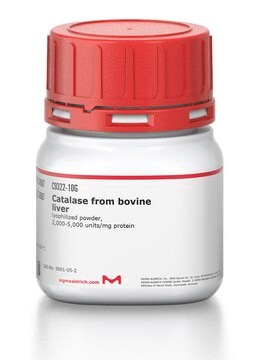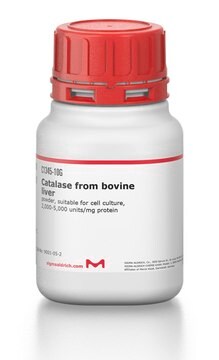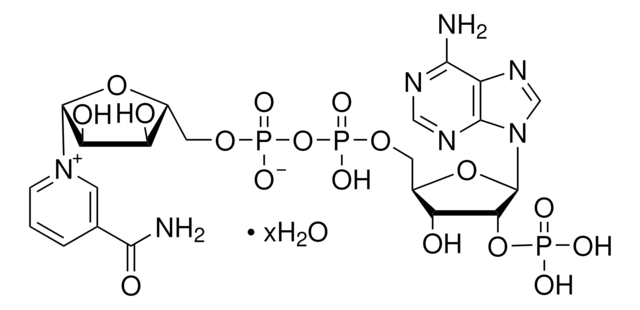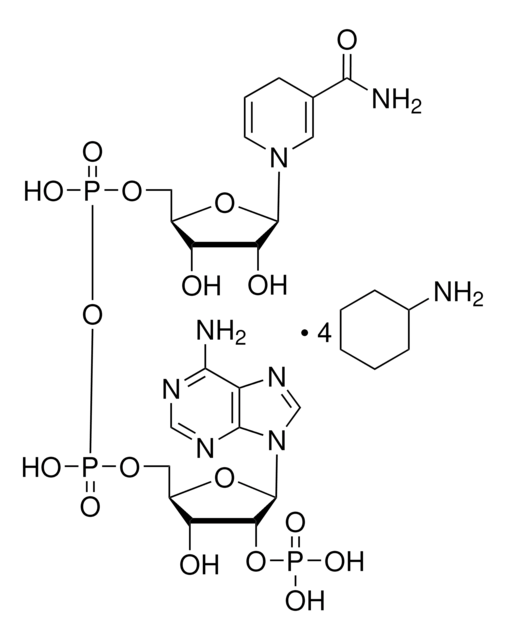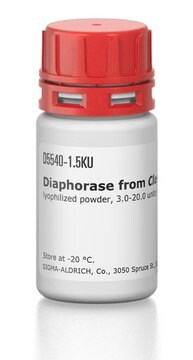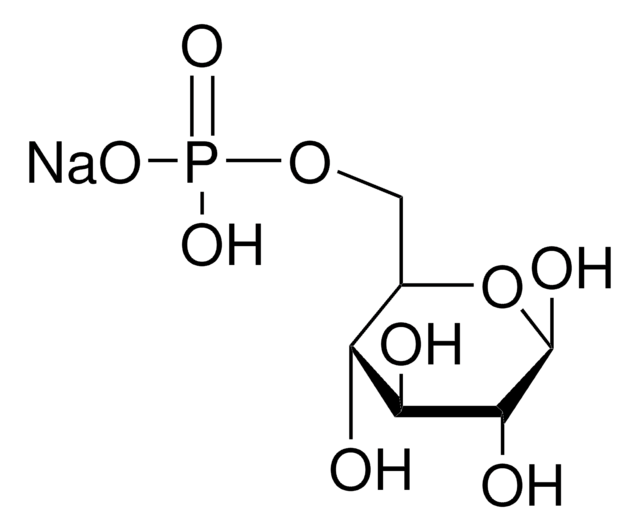F0628
Ferredoxin-NADP+ Reductase from Spinacia oleracea (spinach)
lyophilized powder, ≥15 units/mg solid, secondary activity: ≥10 units/mg solid NADPH diaphorase
Sinonimo/i:
Ferridoxin-NADP+ oxidoreductase
Autenticatiper visualizzare i prezzi riservati alla tua organizzazione & contrattuali
About This Item
Numero CAS:
Numero MDL:
Codice UNSPSC:
12352204
NACRES:
NA.54
Prodotti consigliati
Stato
lyophilized powder
Livello qualitativo
Attività specifica
≥15 units/mg solid
Attività estranea
NADH diaphorase activity ≤10 units/mg solid
Temperatura di conservazione
−20°C
Descrizione generale
Ferredoxin-NADP+ Reductase is a ferredoxin-soluble partner with a molar ratio to PSI of 0.9 and 3.
Applicazioni
Ferredoxin-NADP+ Reductase from Spinacia oleracea (spinach) has been used to test the effect of potential protein partners on the activity of the glyceraldehyde-3-phosphate dehydrogenase (GAPDH)−CP12 preparation. It has also been used in standard assay conditions for phycocyanobilin:ferredoxin oxidoreductase (PcyA) enzyme assay.
Ferredoxin-NADP+ Reductase was used in in vitro ferredoxin-dependent desaturation of fatty acids in cyanobacterial thylakoid membranes. It was also used to regulate glyceraldehyde-3-phosphate dehydrogenase.
Azioni biochim/fisiol
Ferredoxin-NADP+ reductase catalyzes the reversible conversion of reduced ferredoxin to oxidized ferredoxin during photosynthesis. Ferredoxin-NADP(H) reductase constitutes a family of hydrophilic FAD-containing monomeric enzymes that deliver NADPH or low potential one-electron donors to redox-based metabolisms in plastids, mitochondria, and bacteria.
Ferredoxin-NADP+ reductase catalyzes the reversible conversion of reduced ferredoxin to oxidized ferredoxin during photosynthesis. Ferredoxin-NADP(H) reductase constitutes a family of hydrophilic FAD-containing monomeric enzymes that deliver NADPH or low potential one-electron donors to redox-based metabolisms in plastids, mitochondria, and bacteria.
Definizione di unità
One unit will reduce 1.0 millimole of cytochrome C per min at pH 7.5 at 25 °C in the presence of spinach ferredoxin and NADP.
Codice della classe di stoccaggio
11 - Combustible Solids
Classe di pericolosità dell'acqua (WGK)
WGK 3
Punto d’infiammabilità (°F)
Not applicable
Punto d’infiammabilità (°C)
Not applicable
Dispositivi di protezione individuale
Eyeshields, Gloves, type N95 (US)
Scegli una delle versioni più recenti:
Possiedi già questo prodotto?
I documenti relativi ai prodotti acquistati recentemente sono disponibili nell’Archivio dei documenti.
I clienti hanno visto anche
A Conserved Histidine-Aspartate Pair Is Required for Exovinyl Reduction of Biliverdin by a Cyanobacterial Phycocyanobilin:Ferredoxin Oxidoreductase
Tu SL, et al.
The Journal of Biological Chemistry, 281(6), 3127-3136 (2006)
Néstor Carrillo et al.
European journal of biochemistry, 270(9), 1900-1915 (2003-04-24)
Ferredoxin (flavodoxin)-NADP(H) reductases (FNR) are ubiquitous flavoenzymes that deliver NADPH or low potential one-electron donors (ferredoxin, flavodoxin) to redox-based metabolisms in plastids, mitochondria and bacteria. The plant-type reductase is also the basic prototype for one of the major families of
Glyceraldehyde-3-phosphate dehydrogenase is regulated by ferredoxin-NADP reductase in the diatom Asterionella formosa
Mekhalfi M, et al.
The New phytologist, 203, 414-423 (2014)
Ferredoxin-NADP+ Reductase KINETICS OF ELECTRON TRANSFER, TRANSIENT INTERMEDIATES, AND CATALYTIC ACTIVITIES STUDIED BY FLASH-ABSORPTION SPECTROSCOPY WITH ISOLATED PHOTOSYSTEM I AND FERREDOXIN
Cassan N, et al.
The Journal of Biological Chemistry, 280(28), 25960-25972 (2005)
Min Seok Cho et al.
Journal of microbiology (Seoul, Korea), 50(3), 496-501 (2012-07-04)
The Gram-positive bacterium Clavibacter michiganensis subsp. michiganensis is the causal agent of canker disease in tomato. Because it is very important to control newly introduced inoculum sources from commercial materials, the specific detection of this pathogen in seeds and seedlings
Il team dei nostri ricercatori vanta grande esperienza in tutte le aree della ricerca quali Life Science, scienza dei materiali, sintesi chimica, cromatografia, discipline analitiche, ecc..
Contatta l'Assistenza Tecnica.




